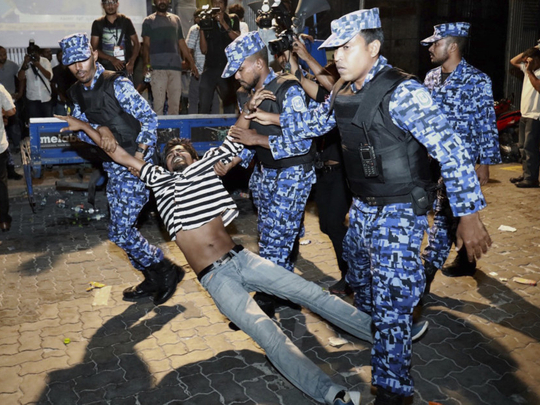
The tranquillity of the Maldives’ tourist resorts, popular with British honeymooners, arms dealers and celebrity footballers alike, is matched only by the fractiousness of its domestic politics. This was underlined by the declaration of a 15-day state of emergency recently.
The contradictions hardly end there — the Maldives successfully trades as one of the world’s most romantic tourism hotspots, while simultaneously maintaining the punishment of flogging for the crime of extramarital sex. A honeymooners’ paradise, it also boasts the world’s highest divorce rate — by a factor of two. A million visitors flood its white sandy beaches every year (half of them European), while in the other direction, Maldives has likely contributed more fighters to Syria and Iraq on a per-capita basis than any other country not directly engaged in the conflict. The political situation has been tumultuous ever since the country’s autocratic leader of 30 years, Maumoon Abdul Gayoom, lost free and fair elections in 2008 to a former political prisoner, Mohammad Nasheed. Liberal and progressive, many of Nasheed’s reforms would be thwarted by the intervention of an “independent” judiciary still loyal to Gayoom. Branded by Gayoom’s opposition as anti-Islamic and accused of meddling in judicial affairs, Nasheed was forced to resign amid a coup in February 2012. The supreme court repeatedly overturned the results of the 2013 elections at the regime’s behest, and Gayoom’s half-brother, Abdullah Yameen, was eventually declared president. Nasheed was thrown in prison, and grudgingly released into exile only following the intervention of human rights lawyer Amal Clooney. President Yameen has ruled with an authoritarian streak, and was accused of corruption, thuggery and international money laundering in an explosive TV documentary. All senior opposition figures have been jailed or forced into exile, joined by a stream of Yameen’s allies, accused of treason, corruption and myriad assassination plots.
Radicalism has thrived amid the government’s ambivalence, if not outright complicity. Foreign reporters have been barred from entering the country, while local journalists have disappeared or been murdered. Well-known local satirist Yameen Rasheed, the Maldives’ answer to Jon Stewart, was stabbed to death outside his door in April 2017. “I’m not particularly afraid of death … But I’d always wanted nature to get me. Not some idiot mullah foot-soldier with a knife,” he wrote, shortly before his murder.
Until the supreme court’s sudden change in loyalty recently, the situation in the Maldives looked hopeless. Declaring its own prosecutors and judges “unduly influenced”, the court ordered release and retrials of nine of President Yameen’s most grievous adversaries. Those freed included Gayoom’s son, MP Faris Maumoon, former defence minister Mohammad Nazim (who took part in the 2012 coup against Nasheed), and former tourism minister Ahmad Adeeb, accused of plotting to blow up the presidential yacht and involvement in money laundering of $1.5 billion.
“It is slightly farcical,” one Maldives-based journalist said of the court’s abrupt decision, requesting anonymity for fear of deportation. “It’s like being paid to throw a football match. You’ve got to make it look realistic. You don’t just turn 180 degrees and blast the ball past your own keeper.”
So integral are the courts to controlling the Maldives that Yameen reacted on Monday by sacking the police commissioner and declaring the 15-day state of emergency. The military stormed the supreme court building and took several judges into custody, including the chief justice. Gayoom and members of his family were also arrested.
The situation is precarious. Gayoom still commands significant loyalty in the security forces — bizarrely, one of the arresting officers was filmed saluting the former dictator as he was taken into custody. Protesters are travelling to the capital from the outer islands to be tear-gassed while international actors, including the US, UK and India, have rounded on Yameen while pumping out travel advisories. The autocrat’s situation is now unsustainable, with both the tourism economy and stomach of the security forces unlikely to withstand the severe crackdown needed to end the stalemate. Early elections, already scheduled for later this year, seem the most likely next step for regaining a semblance of national legitimacy. However, Yameen has no incentive to hold these, having alienated or imprisoned the majority of his former allies, and possessing little democratic support base of his own. Mohammad Nasheed’s party retains the single largest voting majority, despite the odd alliance he has now formed with Gayoom — his long-time jailor and arch-nemesis. Ultimately the ongoing telenovela of Maldivian political intrigue is a distraction from the real crisis — the illegitimacy of the judiciary. Handpicked by Gayoom during his rule and illegally given life tenure under the new constitution in 2010, the judges have been at the centre of most of the Maldives’ recent ills; at least 50 per cent of the 200-odd judges and magistrates have less than seventh-grade education, while a quarter had actual criminal records, including convictions for sexual misconduct, embezzlement, violence and disruption of public harmony.
Resoundingly discredited by groups such as the International Committee of Jurists and the UN’s special rapporteur on the independence of judges and lawyers, the institution demands wholesale reform, and likely the presence of foreign judges on the bench. However excited the opposition are at their recent good fortune, current events are far from a triumph of judicial independence.
— Guardian News & Media Ltd
J. J. Robinson is the author of Maldives: Islamic Republic, Tropical Autocracy. He is the former editor of Minivan News, the country’s first independent English-language news service.








